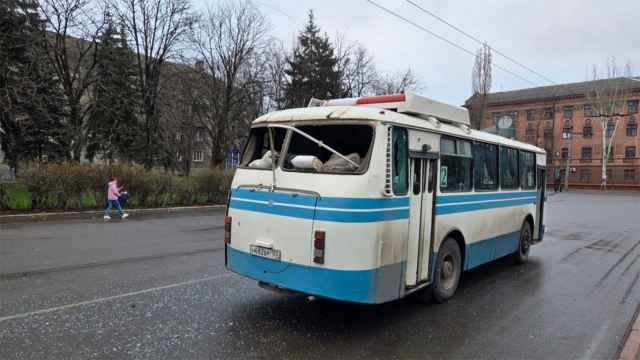The multi-billon dollar tender to design a high-speed rail line between Moscow and Kazan has been delayed, although two international consortiums have already submitted preliminary applications, individuals close to the companies involved said.
The first consortium that applied to build the line includes Deutsche Bank subsidiary DB International, Spanish engineering consultancy Ineco, and Russian design and survey firms Roszheldorproyekt and Lengiprotrans.
The second consists of French railway subsidiary Systra, Spanish conglomerate Acciona, the China Railway Construction Company and Chinese survey and design group FSDI, electronics systems company Thales and Italian railway engineering firm Italferr.
Spokesmen from the high-speed railway project and the consortium companies declined to comment, Vedomosti reported Wednesday.
The results of the tender, which were to be announced in December, will now only be revealed once Russian Railways' investment program for 2014 has been confirmed.
The entire cost of the project, including purchase of high-speed trains and modernization of railway stations, has been estimated at 1.06 trillion rubles ($33 billion), with design and construction of the line to cost about 855 billion rubles.
Alexander Misharin, the rail monopoly's executive in charge of high-speed rails, said Tuesday he expects the government to provide a 380 million non-refundable subsidy to round out the funding of the project, Interfax reported.
The government has said it would provide financing for 60 percent of the project, using 150 billion rubles from the National Welfare Fund and 239 billion rubles from the pension fund via infrastructure bonds — all of which it expects to be returned.
Russian Railways is prepared to provide 30.8 billion rubles, private investors will supply 43 billion rubles, and there are plans to take an additional 223.8 billion rubles out in loans.
The line is set to run across 7 regions, with a trip from Moscow to Kazan taking not more than 3.5 hours and reaching speeds of 400 kilometers per hour. About 200 kilometers of tracks reaching as far as Vladimir may be built by 2018, as opposed to the 409 kilometers — stretching all the way to Nizhny Novrogod — that were previously projected by Finance Minister Anton Siluanov, the source added.
According to schedule, the design was to have been finished by the end of 2014 and approved in the first quarter of 2015, with the project slated for completion in 2018.
These dates may now be modified due to the lack of financing, a person close to the project said, citing discussions two weeks ago at a meeting with Deputy Prime Minister Arkady Dvorkovich.
Contact the author at d.damora@imedia.ru
A Message from The Moscow Times:
Dear readers,
We are facing unprecedented challenges. Russia's Prosecutor General's Office has designated The Moscow Times as an "undesirable" organization, criminalizing our work and putting our staff at risk of prosecution. This follows our earlier unjust labeling as a "foreign agent."
These actions are direct attempts to silence independent journalism in Russia. The authorities claim our work "discredits the decisions of the Russian leadership." We see things differently: we strive to provide accurate, unbiased reporting on Russia.
We, the journalists of The Moscow Times, refuse to be silenced. But to continue our work, we need your help.
Your support, no matter how small, makes a world of difference. If you can, please support us monthly starting from just $2. It's quick to set up, and every contribution makes a significant impact.
By supporting The Moscow Times, you're defending open, independent journalism in the face of repression. Thank you for standing with us.
Remind me later.





